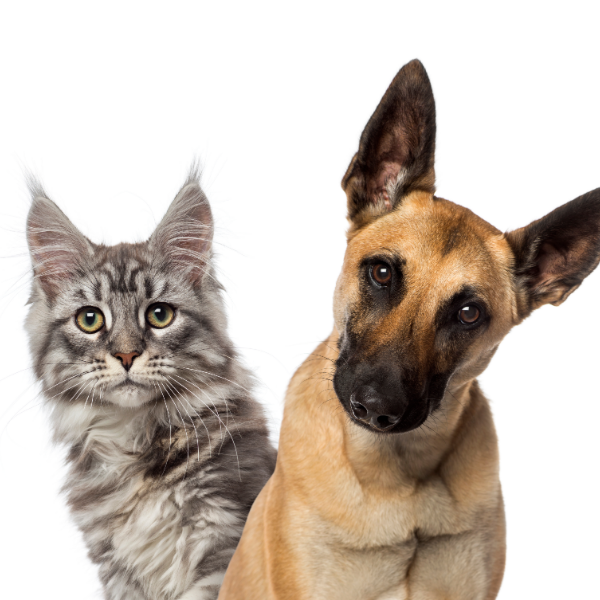Gibson
Written on Friday, February 12th, 2016
In the fall of 2010 -a little over a year old, Gibson came with suspiciously well-developed skills of ‘human manipulation and mind control.’ I fell in love … instantly.
A purebred Seal Lynx Point Birman, this breed is known for its affectionate, gentle, and loyal companionship as well as being extremely intelligent. Hmmm… trouble. Gibson is of course the resident ‘under the covers mascot’ and is also self-employed as my ‘Executive Personal Assistant.’ Truth be told, he created this position himself. Again with the suspiciously well-developed skills of ‘human manipulation and mind control.’ He takes his work seriously – I’ll give him that. I wake up before I want to so that I am never late for anything – especially his breakfast. He is devoted to helping me achieve great things in my life, such as mastering the Ancient Art of ‘The perfect chin scratch’ as well as the mysterious ‘Two hands never one Belly Rub Application.’ He maintains my schedule in accordance with his and he happily inspects my work. I do however question his methods of ‘complete body coverage’ over my working surface but I am hopeful that there may be a better solution in the future. Or not.
Fast track to 2013 and Gibson was a very sick kitty. Within 48 hours we found ourselves in the office of Dr. Cichon at Sunwood Veterinary Hospital thanks to Kathy Pander. Dr. Cichon is a homeopathic veterinarian who goes beyond the call of duty. His love and compassion for animals resonate in the attention and guidance that he provides. Gibson was diagnosed with inflammatory bowel disease, chronic pancreatitis along with ascending cholangiohepatitis. Simply put -the poor guy’s plumbing just wasn’t working and the damage was done.
To make this boy healthy again – his dietary needs had to change. We’ve never looked back – 3P Naturals ever since. We figured it out together, took a couple of months to adjust -but it has saved his life. Without question, eliminating commercial pet food and switching over to a raw food diet was the game-changer for Gibson’s quality of life as well as my sanity. 3P is the only option in this house! He gets an abundance of other goodies mixed in with his food -organic apple sauce, pumpkin, hemp oil, and Aloe Vera juice as well as digestive enzymes, supplements, and the occasional hit of catnip.
3P Naturals has set an unprecedented standard of quality for this industry. With transparent company objectives, product accountability, and an abundance of consumer resources and education, (Carnivore Corner and Pet Nutrition are great!) it just doesn’t get any better than that. From both Gibson and I – THANK YOU 3P!! We love you.
Could Your Pet Have a Thiamine Deficiency?
Written on Saturday, September 19th, 2015
The Importance of Including Organ Meats to the Raw Diet
Written on Monday, June 22nd, 2015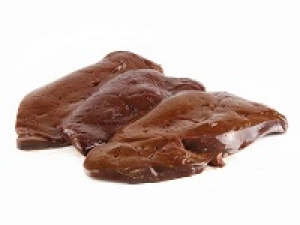
Organ meats? Gross, right? Well, even though they may seem gross to most of us, organ meats are an extremely important component of a carnivore’s diet. They contain an array of important trace minerals, vitamins, and amino acids that are essential for helping your pet stay healthy and vital.
Dogs: Approximately 10% of the dog’s diet should consist of organ meat.
Cats: Cats require 15-20% of the total diet to consist of organ meat, mainly liver and heart. Heart meat is a great source of taurine for cats and is essential to them since they cannot synthesize it from precursor substances.
Menu items from 3P Naturals include: Heart & liver from beef, buffalo, lamb, chicken, turkey, duck, and more
NUTRIENTS FOUND IN LIVER AND HEART
Just by adding organ meats to the diet, you will be providing the following important nutrients.
Preventing Fleas, Naturally
Written on Monday, May 11th, 2015
An issue that pops up this time of year is fleas! YUCK! Many pet parents have chosen to feed raw because we don't want to add to the environmental stresses that today's domestic pets are exposed to. Most of us would rather avoid using chemicals to get rid of fleas if we can. Healthy skin is a major factor in keeping fleas at bay. A correctly fed raw diet is a great start to flea prevention along with nutritional supplementation and a natural flea spray that contains essential oils that deter pests. If your pet does have fleas, you will need to treat your pet and your house too. If the flea infestation is bad enough, you may have to go the chemical route but working towards prevention is key! A natural solution for your house other than chemical flea powders is to use diatomaceous earth in all corners, furniture, and on any carpet, you may have. Ask your natural pet food store if they carry this product. There are also effective aromatherapy sprays that can also be used to help deter fleas on a daily basis when your pet goes outside where they could pick up a flea. These options might not always solve a flea issue but they are a great way to prevent flea problems from arising. A great natural option can be found online from Equus Soap Co. If you're worried about a more serious problem like a flea infestation, it's time to talk to your veterinarian.
Good luck fighting those little fleas this spring!
Chronic Vomiting in Cats – No, It’s Not Normal!
Written on Monday, May 11th, 2015
I have heard from cat owners who say they believe their cat’s chronic vomiting is a normal occurrence. It definitely is not! If your cat experiencing nausea on a regular basis, it is time to look at the diet and your cat’s overall health. There are several reasons why this scenario occurs:
1. Enzyme deficiency. Often, these cats are looking for any way to add a digestive aid to their diet. They may be excessive grass eaters. They may even try to eat inedible objects. These behaviors are not something to ignore. If an animal has no access to dietary enzymes, the whole organism is compromised and this can lead to disease of the internal organs. If your cat eats only a dry or cooked diet, there are no live enzymes in the food.
Pancreatitis: How You Can Help Your Pet with Food
Written on Wednesday, April 1st, 2015
Inflammatory disease of the pancreas is a growing concern for veterinarians and pet owners. Vets are noticing this issue coming up more frequently in clinical practice. But what is it? How is it diagnosed? What can cause it? What solutions do we have for helping animals with this problem? Nutrition is an important place to start. The pancreas is a digestive and endocrine organ so it’s logical to start by looking at foods that support healthy digestion and metabolic function. Chronic inflammation of the digestive organ could be a sign of improper diet, hormonal imbalance, blunt abdominal injury, poisoning, infectious disease, immune-mediated illness, and some drug therapies. Azotemia and increased liver enzymes are common with this condition. There are some breeds of dogs that are more prone to getting pancreatitis including Miniature Schnauzers, Miniature Poodles, and Spaniels. German Shepherds are prone to pancreatic insufficiency (EPI) which can also lead to pancreatitis episodes and other health problems. It’s important to do an examination and lab work to determine the most likely cause and treatment. We will look at how we can feed the body and support the pancreas so it can function correctly.
Switching Your Pet to Raw Diet Made Easy
Written on Sunday, January 25th, 2015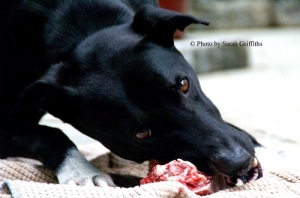
It's about time we made this simple! Switching to raw doesn't have to be hard. The following article breaks it down into easy steps and helpful tips.
Urinary Tract Health in Dogs and Cats
Written on Tuesday, December 30th, 2014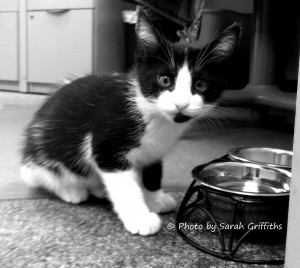
Diseases of the urinary system are common amongst dogs and cats. I'm regularly asked about these issues and so I've put together a guideline on the signs and symptoms as well as dietary solutions that may help you to solve the issue if you choose to take the holistic route. I find that with the appropriate dietary adjustments, most urinary issues can be resolved and/or the intensity of symptoms greatly reduced.
Brain Food
Written on Tuesday, December 16th, 2014
Have you ever wondered if there is anything you can do nutritionally to enhance your dog’s intelligence? Well, there is! Fat balance is one of many important aspects of feeding a balanced raw diet. Sixty percent of the mammalian brain is made up of fat so in order for it to function at its best, it needs brain food, literally!
It has been proven that a healthy diet improves a puppy’s ability to learn faster and remember more. It also enhances an older dog’s ability to retain their mental sharpness and improves their overall sense of well-being. DHA (an omega 3 fatty acid) is especially important for improving memory, learning, and helping to fight mental disorders.
Which Bones are Best?
Written on Sunday, November 16th, 2014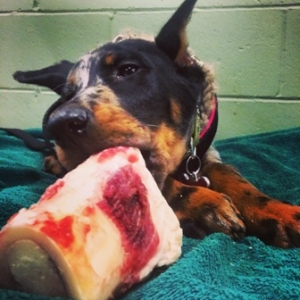
Many of the questions I have received this month have been bone-related so this article is the product of the great questions that were asked. We'll break it down into an easy-to-follow guide on how to feed bones safely and how to choose the best ones for your pet. Bones are a staple when feeding a balanced raw food diet and important for dental/skeletal health but there are many types of bones to choose from. We have a large variety of sizes and shapes to fit the needs of all types of dogs. Certain bones may not be appropriate for certain pets. This guide will help you to decide what kinds of bones will suit your animal best.


